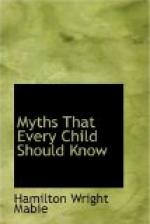Then, sending for the head cook, he gave strict orders that all sorts of delicacies, such as young people are usually fond of, should be set before Proserpina. He had a secret motive in this; for, you are to understand, it is a fixed law that, when persons are carried off to the land of magic, if they once taste any food there, they can never get back to their friends. Now, if King Pluto had been cunning enough to offer Proserpina some fruit, or bread and milk (which was the simple fare to which the child had always been accustomed), it is very probable that she would soon have been tempted to eat it. But he left the matter entirely to his cook, who, like all other cooks, considered nothing fit to eat unless it were rich pastry, or highly seasoned meat, or spiced sweet cakes—things which Proserpina’s mother had never given her, and the smell of which quite took away her appetite, instead of sharpening it.
But my story must now clamber out of King Pluto’s dominions, and see what Mother Ceres has been about since she was bereft of her daughter. We had a glimpse of her, as you remember, half hidden among the waving grain, while the four black steeds were swiftly whirling along the chariot in which her beloved Proserpina was so unwillingly borne away. You recollect, too, the loud scream which Proserpina gave, just when the chariot was out of sight.
Of all the child’s outcries, this last shriek was the only one that reached the ears of Mother Ceres. She had mistaken the rumbling of the chariot wheels for a peal of thunder, and imagined that a shower was coming up, and that it would assist her in making the corn grow. But, at the sound of Proserpina’s shriek, she started, and looked about in every direction, not knowing whence it came, but feeling almost certain that it was her daughter’s voice. It seemed so unaccountable, however, that the girl should have strayed over so many lands and seas (which she herself could not have traversed without the aid of her winged dragons), that the good Ceres tried to believe that it must be the child of some other parent, and not her own darling Proserpina who had uttered this lamentable cry. Nevertheless, it troubled her with a vast many tender fears, such as are ready to bestir themselves in every mother’s heart, when she finds it necessary to go away from her dear children without leaving them under the care of some maiden aunt, or other such faithful guardian. So she quickly left the field in which she had been so busy; and, as her work was not half done, the grain looked, next day, as if it needed both sun and rain, and as if it were blighted in the ear and had something the matter with its roots.
The pair of dragons must have had very nimble wings; for, in less than an hour, Mother Ceres had alighted at the door of her home and found it empty. Knowing, however, that the child was fond of sporting on the seashore, she hastened thither as fast as she could, and there beheld the wet faces of the poor sea nymphs peeping over a wave. All this while, the good creatures had been waiting on the bank of sponge, and, once every half-minute or so, had popped up their four heads above water, to see if their playmate were yet coming back. When they saw Mother Ceres, they sat down on the crest of the surf wave, and let it toss them ashore at her feet.




